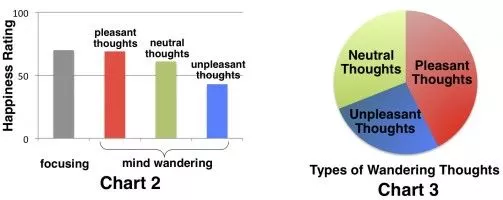“Examination is the first step: becoming alert to what passes through your mind. And there is constant traffic — so many thoughts, so many desires, so many dreams are passing by. You have to be watchful; you have to examine each and everything that passes through the mind. Not a single thought should pass unawares, because that means you were asleep. Become more and more observant.” ~ an excerpt from Osho’s teachings.
A human mind is a wandering mind. Unlike animals, we spend a lot of time thinking about events that happened in the past, might happen in the future, or may never happen at all. A wandering mind appears to be our brain’s default mode of operation.
No matter the task or activity, we can be present physically, yet be in a completely different zone mentally.
Humans can pretend that they are listening and not listen at all. We get lost in thoughts without being mindful of them. According to some studies, as much as 50% of our waking hours are spent in some form of mind-wandering whether we want to or not.
 A wandering mind has its own pros and cons. For example, researchers say that a wandering mind is an unhappy one but also at the same time “spacing out” is actually a special state that allows for increased creativity and decision-making.
A wandering mind has its own pros and cons. For example, researchers say that a wandering mind is an unhappy one but also at the same time “spacing out” is actually a special state that allows for increased creativity and decision-making.
It is necessary to understand that when our mind wanders in different zones, it evokes negative and positive emotions within us. But the good news is if you make a conscious effort to be a watchful observer of your own thoughts, it can work in your favour too.
Identify issues, problems and questions, that you usually tend to think about and train your mind to automatically travel to those issues while mind-wandering. This art of thinking is also known as conscious daydreaming.
Conscious, constructive daydreaming has a great role to play in expanding our consciousness. It is one of the vital tools that can have outstanding benefits to gain new insights.
Conscious Daydreaming
We all daydream. Albert Einstein and Isaac Newton made some of the most important discoveries when they allowed their minds to wander. Daydreaming is often considered as a sheer waste of time.
Parents or schools encourage children to focus on task at hand, although learning to focus is really important but we din’t know is that we are better prepared to focus on the external world when we regularly engage in daydreaming.
Several research states that daydreaming enhances children’s creativity and hones their senses to understand their environment better. Children who daydream turn out to be empathetic and have a better emotional understanding. Instead of refraining children from daydreaming, we should teach them (if they aren’t naturally engaged in daydreaming), and make them aware when their minds are drifting.

The human brain is actually much more active while daydreaming than when focused on routine tasks. Even for adults, researchers found out that daydreaming can be beneficial in many ways.
An experiment showed that while dealing with complex problems, daydreaming could actually be an aid to figuring out solutions. Another research showed that daydreaming improves thinking skills, and also enhances creativity.
Looking at the process of daydreaming from the law of attraction point of view leads to quite a few interesting observations. While daydreaming, you are intensely thinking and your mind is producing rhythm and frequencies, which you can use to attract positive vibrations. The idea is to be mindful of each and every thought.
Also, conscious daydreaming is a great way to untangle the tangled thoughts in your subconscious mind, which acts as a blockage on your journey to constructive thinking. Each blockage, maybe fear, is capable of changing the flow of our thoughts and conscious daydreaming can help us in getting rid of them.
Once you get to the root and work on your thinking pattern, living in the present won’t seem like a tedious task. As you start becoming more conscious of your present, you will find your mental state healthy and pleasant throughout the day!
“The secret of health for both mind and body is not to mourn for the past, nor to worry about the future, but to live the present moment wisely and earnestly.” ~ Gautama Buddha
Image Source
Daydream
Benefits of Mind wandering
Mind thoughts and frequencies , Mind wandering chart
Mind and idea
Daydreaming



